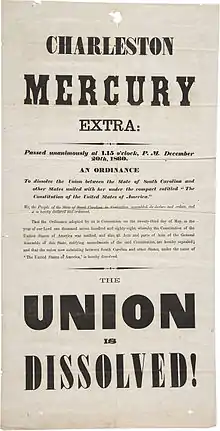Charleston Mercury
The Charleston Mercury was a secessionist newspaper in Charleston, South Carolina, founded by Henry L. Pinckney in 1819. He was its sole editor for fifteen years. It ceased publication with the Union Army occupation of Charleston in February 1865. After the American Civil War, publication resumed in November 1866 before the paper closed permanently two years later in 1868.[1]

History
During the American Civil War, the paper was "strongly secessionist", calling upon South Carolinian men to take up arms to defend the South.[2] Its owner, Robert Barnwell Rhett, had two plantations and 190 enslaved persons.[3] The paper was critical of Davis and Confederate generals, in contrast with its pro-Davis competitor the Charleston Courier.[1] Rhett's son R. Barnwell Rhett Jr. was the editor.[4]
Humorist George William Bagby was a Richmond, Virginia correspondent of the Charleston Mercury during the Civil War era and "covered the politics of the war and made a reputation for Hermes, his pen name, as a fearless writer who would criticize Confederate General Robert E. Lee as easily as Confederate President Jefferson Davis".
References
- Heidler, David Stephen, and Jeanne T. Heidler (eds.) (2002). Encyclopedia of the American Civil War: A Political, Social, and Military History. New York: W. W. Norton & Company. pages 407–408. ISBN 9780393047585.
- Simpson, Brooks D.; Sears, Stephen W.; Aaron, Sheehan-Dean (November 3, 1860). Charleston Mercury. ISBN 9781598531381.
- Henshaw, Tom (December 18, 1960). "The Secession of South Carolina". The News and Courier (Charleston, South Carolina). p. 18.
- Rosen, Robert N. (1994). Confederate Charleston: An Illustrated History of the City and the People During the Civil War. Univ of South Carolina Press. p. 41. ISBN 978-0-87249-991-1.